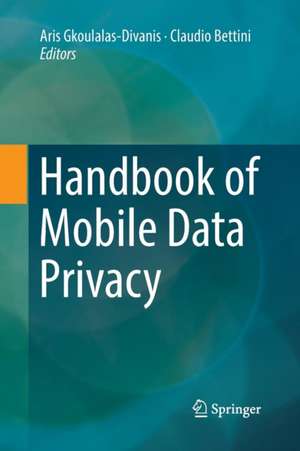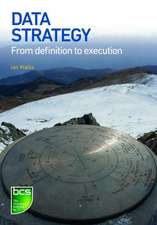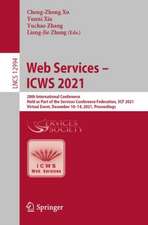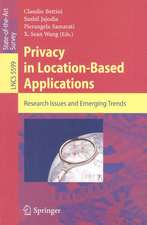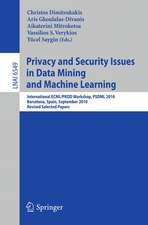Handbook of Mobile Data Privacy
Editat de Aris Gkoulalas-Divanis, Claudio Bettinien Limba Engleză Paperback – 26 dec 2018
The advances in mobile devices and positioning technologies, together with the progress in spatiotemporal database research, have made possible the tracking of mobile devices (and their human companions) at very high accuracy, while supporting the efficient storage ofmobility data in data warehouses, which this handbook illustrates. This has provided the means to collect, store and process mobility data of an unprecedented quantity, quality and timeliness. As ubiquitous computing pervades our society, user mobility data represents a very useful but also extremely sensitive source of information. On one hand, the movement traces that are left behind by the mobile devices of the users can be very useful in a wide spectrum of applications such as urban planning, traffic engineering, and environmental pollution management. On the other hand, the disclosure of mobility data to third parties may severely jeopardize the privacy of the users whose movement is recorded, leading to abuse scenarios such as user tailing and profiling.
A significant amount of research work has been conducted in the last 15 years in the area of mobility data privacy and important research directions, such as privacy-preserving mobility data management, privacy inlocation sensing technologies and location-based services, privacy in vehicular communication networks, privacy in location-based social networks, privacy in participatory sensing systems which this handbook addresses.. This handbook also identifies important privacy gaps in the use of mobility data and has resulted to the adoption of international laws for location privacy protection (e.g., in EU, US, Canada, Australia, New Zealand, Japan, Singapore), as well as to a large number of interesting technologies for privacy-protecting mobility data, some of which have been made available through open-source systems and featured in real-world applications.
| Toate formatele și edițiile | Preț | Express |
|---|---|---|
| Paperback (1) | 823.49 lei 6-8 săpt. | |
| Springer International Publishing – 26 dec 2018 | 823.49 lei 6-8 săpt. | |
| Hardback (1) | 1171.46 lei 6-8 săpt. | |
| Springer International Publishing – 7 noi 2018 | 1171.46 lei 6-8 săpt. |
Preț: 823.49 lei
Preț vechi: 1029.37 lei
-20% Nou
Puncte Express: 1235
Preț estimativ în valută:
157.57€ • 164.96$ • 130.38£
157.57€ • 164.96$ • 130.38£
Carte tipărită la comandă
Livrare economică 05-19 aprilie
Preluare comenzi: 021 569.72.76
Specificații
ISBN-13: 9783030074593
ISBN-10: 3030074595
Pagini: 403
Ilustrații: XXXVIII, 403 p. 91 illus., 74 illus. in color.
Dimensiuni: 155 x 235 mm
Greutate: 0.62 kg
Ediția:Softcover reprint of the original 1st ed. 2018
Editura: Springer International Publishing
Colecția Springer
Locul publicării:Cham, Switzerland
ISBN-10: 3030074595
Pagini: 403
Ilustrații: XXXVIII, 403 p. 91 illus., 74 illus. in color.
Dimensiuni: 155 x 235 mm
Greutate: 0.62 kg
Ediția:Softcover reprint of the original 1st ed. 2018
Editura: Springer International Publishing
Colecția Springer
Locul publicării:Cham, Switzerland
Cuprins
1 Introduction to Mobility Data Privacy.- 2 Modeling and Understanding Intrinsic Characteristics of Human Mobility.- 3 Privacy in Location-Sensing Technologies.- 4 Privacy Protection in Location-based Services: A Survey.- 5 Analyzing Your Location Data with Provable Privacy Guarantees.- 6 Opportunities and Risks of Delegating Sesning Tasks to the Crowd.- 7 Location Privacy in Spatial Crowdsourcing.- 8 Privacy in Geospatial Applications and Location-Based Social Networks.- 9 Privacy of Connected Vehicles.- 10 Privacy by Design for Mobility Data Analytics.- 11 Systems for Privacy-Preserving Mobility Data Management.- 12 Privacy-Preserving Release of Spatio-temporal Density.- 13 Context-adaptive Privacy Mechanisms.- 14 Location Privacy-Preserving Applications and Services.
Recenzii
“This handbook is an interesting, well-prepared, and seriously edited library addition for anyone interested in privacy.” (Agusti Solanas, Computing Reviews, July 22, 2019)
Notă biografică
Aris Gkoulalas-Divanis is the technical lead on data protection and privacy for IBM Watson Health. In this role, he is responsible for the design and integration of novel privacy-protection methods to the IBM Watson Platform for Health and the IBM Cloud, to support IBM customers’ privacy and utility requirements. Aris received his PhD in Computer Science from the University of Thessaly in 2009. His PhD dissertation was awarded the Certificate of Recognition and Honorable Mention in the 2009 ACM SIGKDD Dissertation Award. He has been a postdoctoral research fellow in the Department of Biomedical Informatics of Vanderbilt University (2009-2010), and a Research Scientist in IBM Research-Zurich (2010-2012) and IBM Research-Ireland (2012-2016). His research interests are in the areas of databases, data mining, privacy-preserving data mining, privacy in trajectories and location based services, privacy in medical data, and knowledge hiding. In these areas, he has given many seminars and two tutorials (ECML/PKDD 2011, SDM 2012), he has published more than 80 research works - including four Springer books, and he has applied for or being granted more than 25 patents (received three IBM Invention Achievement Awards). Aris is a regular reviewer in top quality journals, as well as participates to the program committee of many prestigious conferences. He serves as an associate editor of the Knowledge and Information Systems (KAIS) journal, the IEEE Transactions on Information Forensics and Security (T-IFS), the International Journal of Research & Development Innovation Strategy (IJRDIS), and the International Journal of Knowledge-Based Organizations (IJKBO). Since 2014 he is an area editor for ACM Computing Reviews (CR) covering the Information Systems category. Aris is a senior member of IEEE, a professional member of ACM, SIAM and AAAS, and an at-large member of UPE and Sigma Xi.
Claudio Bettini is professor of computer science at the University of Milan, where he leads the Every-Ware laboratory at the computer science department. Claudio received his PhD in Computer Science from the University of Milan in 1993. He has been post-doc at IBM Research, NY, and, for more than a decade, an affiliate research professor at the Center for Secure Information Systems at George Mason University, VA. His research interests cover the areas of mobile and pervasive computing, data privacy, temporal and spatial data management and intelligent systems. He is the author of over 150 peer-reviewed publications on these topics. He acted as co-PI of several international projects on data privacy and contributed as project reviewer in the EU Horizon H2020 ERC and FET initiatives. Among his many organizational activities he acted as general chair of IEEE PERCOM 2017 and IEEE MDM 2013 and as TPC Chair of IEEE PERCOM 2013. He is a member of the steering committee of IEEE PerCom and served as associate editor of the Pervasive and Mobile Computing Journal, The VLDB Journal, and the IEEE Transactions on Knowledge and Data Engineering. In 2011 he founded EveryWare Technologies, a startup developing innovative mobile apps and services for privacy and assistive technologies. He is a IEEE senior member.
Claudio Bettini is professor of computer science at the University of Milan, where he leads the Every-Ware laboratory at the computer science department. Claudio received his PhD in Computer Science from the University of Milan in 1993. He has been post-doc at IBM Research, NY, and, for more than a decade, an affiliate research professor at the Center for Secure Information Systems at George Mason University, VA. His research interests cover the areas of mobile and pervasive computing, data privacy, temporal and spatial data management and intelligent systems. He is the author of over 150 peer-reviewed publications on these topics. He acted as co-PI of several international projects on data privacy and contributed as project reviewer in the EU Horizon H2020 ERC and FET initiatives. Among his many organizational activities he acted as general chair of IEEE PERCOM 2017 and IEEE MDM 2013 and as TPC Chair of IEEE PERCOM 2013. He is a member of the steering committee of IEEE PerCom and served as associate editor of the Pervasive and Mobile Computing Journal, The VLDB Journal, and the IEEE Transactions on Knowledge and Data Engineering. In 2011 he founded EveryWare Technologies, a startup developing innovative mobile apps and services for privacy and assistive technologies. He is a IEEE senior member.
Caracteristici
Provides both the traditional research directions in the area of mobile privacy, as well as modern ones, involving privacy of connected vehicles, location privacy in spatial crowdsourcing, and many more Addresses the state-of-the-art systems and modern applications in the area of mobility data privacy, demonstrating the use of user mobility information for analytic or other purposes, in a privacy-preserving manner Identifies important privacy gaps in the use of mobility data and has resulted to the adoption of international laws for location privacy protection (e.g., in EU, US, Canada, Australia, New Zealand, Japan, Singapore)
